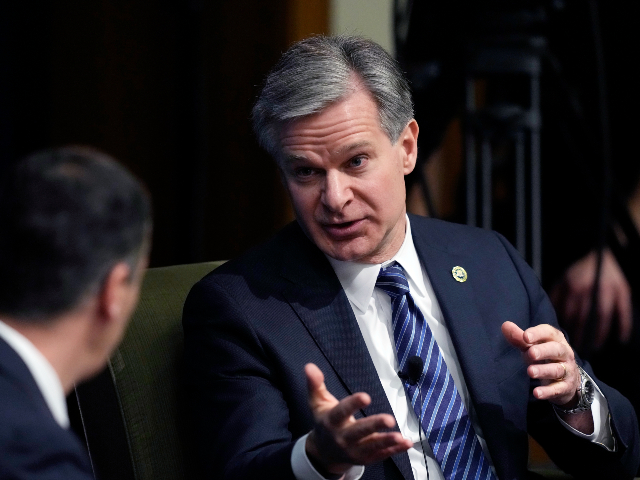A recent surge in support from young Americans for the Hamas terrorist group can be attributed predominantly to the social app TikTok, according to Wisconsin Republican Rep. Mike Gallagher, who described it as “the largest scale malign influence operation ever conducted,” as he accused the Chinese “digital fentanyl” of “brainwashing our youth against the country and our allies.”
In a three-minute clip posted Saturday, Rep. Mike Gallagher (R-WI), who serves as chair of the Select Committee on China, expressed concern over the finding that a majority of young Americans seem to justify the actions of Hamas, as he described the harrowing images and accounts of brutal violence against innocent Israeli citizens from Hamas’ October 7 massacre.
“For weeks, we’ve seen the clips and read the firsthand stories documenting Hamas’ atrocities: burned bodies, decapitated babies, raped women, children tied together with their parents, mutilated corpses — images and stories so malignantly evil it’s hard to put into words,” he said.
Moreover, Rep. Gallagher describes facing a “further shock” after witnessing rallies at elite college campuses “celebrating Hamas’ murderous cause,” along with letters from faculty members “excusing” the acts of U.S. government-designated terrorists.
“I thought I’d seen the bottom; I thought I’d gone numb,” he said, “but then I read a Harvard poll [revealing that] 51 percent of Americans ages 18 to 24 believe Hamas was justified in its brutal terrorist attacks on innocent Israeli citizens on October 7.”
Questioning how we’ve reached a point “where a majority of young Americans hold such a morally bankrupt view of the world” and where many “were rooting for terrorists who had kidnapped American citizens and against a key American ally, our closest ally in the Middle East,” Rep. Gallagher pointed to the source of where these individuals receive their “raw news” which informs them an “upside down view of the world.”
Attributing the perspective shift to the influence of the Chinese-owned TikTok, which is under the heavy influence of the Chinese Communist Party (CCP), he noted that “TikTok is not just an app teenagers use to make viral dance videos — a growing number of Americans rely on TikTok for their news.”
“Today, TikTok is the top search engine for more than half of Gen Z and it’s controlled by America’s foremost adversary — the Chinese Communist Party,” he noted, adding that its Chinese parent company, Bytedance, cannot be trusted because in China “there is no such thing as a private company.”
Addressing concerns over the influence and operations of TikTok, Rep. Gallagher emphasized the platform’s role in advancing certain narratives while silencing others, as a means to manipulate users’ views on various affairs, including the conflict between Israel and Hamas.
“We know for a fact that the CCP uses TikTok to push its propaganda and censor views that diverge from the party line,” he said, noting that “reports have confirmed that TikTok spied on journalists who wrote negative stories about TikTok.”
In addition, he explained, “Chinese state media pushed divisive information about US politicians ahead of midterm elections [and] numerous reports have found TikTok censoring and suppressing content about Xinjiang, Tibet, Tiananmen Square, and other issues sensitive to the CCP.”

Palestinian supporters gather for a protest at Columbia University on Oct. 12, 2023, in New York. (AP Photo/Yuki Iwamura, File)
Rep. Gallagher also raised concerns about the extent of censorship exercised by TikTok and its parent company, highlighting specific incidents of bias that underscore the matter, including against Israel, Jews, the West, and various other issues:
TikTok has also suppressed content about LGBT issues and even temporarily blocked a teenage American Muslim activist who criticized the CCP’s treatment of Uyghur Muslims. If you doubt that the CCP would introduce antisemitic or anti-Western bias into apps under its de facto control, consider that on October 31, The Wall Street Journal reported that Chinese web platforms Baidu and Alibaba have wiped Israel off the map literally. The two most widely used mapping programs in China show the outline of Israel’s territory but do not label it as Israel and may not for some time.
“For those who know the CCP, this comes as no surprise,” he added. “Propaganda and censorship are core features of its governing philosophy.”
Drawing a historical parallel, the congressman warned about the potential risks of TikTok’s presence in the United States, arguing that TikTok serving as CCP spyware is a “best-case scenario.”
“That’s why so many state and national governments have banned it on official phones. But in the worst-case scenario, TikTok is perhaps the largest scale malign influence operation ever conducted,” he said.
“Allowing a CCP-controlled entity to become the dominant media platform in America would be as if, in 1962, right before the Cuban missile crisis, we had allowed Pravda and the KGB to purchase the New York Times, the Washington Post, ABC, and NBC — and that’s probably understating the stupidity,” he added.
He concludes by calling for an urgent “ban” on TikTok, “or at least force the sale to an American company.”
“The clock is ticking,” he cautioned.
In an op-ed on the subject published Monday, Gallagher cites evidence of TikTok’s “predatory nature” as he contrasted its content in China, which is educational and time-restricted, with the app’s content in the United States, which he describes as being addictive and filled with polarizing material.
“In China, there is a safely sanitized version called Douyin. That version, using much of the same technology, shows kids science experiments and other educational content, and its use is limited to forty minutes per day,” he wrote. “Here in America, the application’s algorithm is exquisitely tuned to prioritize polarizing outrage and addictive, brain-numbing nonsense (at best) and dangerous propaganda (at worst).”
“Put differently, ByteDance and the CCP have decided that China’s children get spinach, and America’s get digital fentanyl,” he added.
He then highlighted the pervasive influence of TikTok among young Americans.
“[W]e are absolutely hooked, with 16 percent of teens using it ‘almost constantly.’ Today, 69.7 percent of Americans aged 12–17, 76.2 percent aged 18–24, and 54 percent aged 25–34 use TikTok,” he wrote.
“By tweaking the TikTok algorithm, the CCP can censor information and influence Americans of all ages on a variety of issues,” he added. “It can shape what facts they consider accurate, and what conclusions they draw from world events.”
Emphasizing the strategic approach of the Chinese government towards information dissemination, Rep. Gallagher cited Chinese President Xi Jinping, arguing that he “understands the importance of information warfare — or the ‘smokeless battlefield’” as he’s referred to it.
“In a text regarding ‘military political work,’ Xi declared, ‘The crumbling of a regime always starts in the realm of ideas … changing the way people think is a long-term process. Once the front lines of human thought have been broken through, other defensive lines also become hard to defend.'”
He also noted that top U.S. intelligence officials, including CIA Director William J. Burns and FBI Director Christopher Wray, have unequivocally warned about the national security threats posed by TikTok, citing concerns over pro-Hamas content and other issues.

FBI Director Christopher Wray speaks at the Gerald R. Ford School of Public Policy at the University of Michigan, Friday, Dec. 2, 2022, in Ann Arbor, MI. Wray is raising national security concerns about TikTok, warning Friday that control of the popular video-sharing app is in the hands of a Chinese government “that doesn’t share our values.” (AP Photo/Carlos Osorio)
According to Rep. Gallagher, arguments citing the First Amendment to oppose a TikTok ban miss the mark, as historical precedence shows that Congress has acted to prevent foreign adversaries from owning or controlling media and communication platforms critical to national security:
Indeed, Congress has a long history of preventing foreign-controlled companies from operating in sensitive sectors of the U.S. economy, including in the media. For a century, the Federal Communications Commission has blocked concentrated foreign ownership of radio and television assets on national security grounds. Various laws and regulations today restrict Beijing-controlled Huawei from building telecommunications infrastructure in the U.S. market, even as such infrastructure serves (like TikTok) as a platform for transmitting speech.
“The point is that neither banning Huawei nor banning TikTok restricts the speech of Americans,” he added. “To the contrary, doing so protects our public square from the surveillance, malign influence, censorship, and propaganda of a foreign adversary.”
He concluded by urging Congressional action to ban the short-form video hosting platform because, “[s]o long as TikTok — and control of its algorithm — remain in the grip of the Chinese Communist Party, we are ceding the ability to censor Americans’ speech to a foreign adversary.”
The matter comes as TikTok continues to come under scrutiny by various governments over fears that Beijing might exploit it for user data or its agendas.
In September, a Senate Intelligence Committee Hearing on countering China’s “malign influence operations” in the United States revealed an “absolutely terrifying” and unprecedented scenario in which the communist Chinese government could use its “massive” data procured from TikTok in a potential military conflict.
The U.S., UK, and New Zealand have prohibited the app on official devices, even though TikTok asserts it has not and would not share data with China’s government.
In 2020, then-President Donald Trump tried to outright ban new downloads of the Chinese app, but a series of court decisions blocked the ruling from going into effect.
Since then, many have changed their stance, with Sen. Mark Warner (D-VA) eventually admitting, “As painful as it is for me to say, if Donald Trump was right and we could’ve taken action then, that’d have been a heck of a lot easier than trying to take action [now].”
TikTok’s parent company, ByteDance, has also been caught snooping on U.S. and UK journalists in multiple instances. The Chinese app has even shown itself to pose an outright danger to kids and teens and has become a national security threat that has meddled in U.S. elections.
Joshua Klein is a reporter for Breitbart News. Email him at jklein@breitbart.com. Follow him on Twitter @JoshuaKlein.

COMMENTS
Please let us know if you're having issues with commenting.